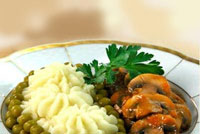|
Tradition, Not Magic in Russia�s Mushrooms
13 October, 2004
September and October herald
a very Russian tradition that can even be called a
national sport � mushroom picking. Every weekend
buses and trains are packed with people in muddy
boots and large backpacks heading out of the city
and into the forests.

In fact, Russians love mushrooms so much that even
those who emigrate continue to pick them in the
forests of Europe and America. Hikers in
Washington are stunned when they see people
crouching in the undergrowth with baskets, but in
Russia this is a typical autumnal sight.
Dozens of different types of mushrooms are then
piled along with colorful berries and herbs at
city markets. Besides the splendor of the fall
harvest there is much at a Russian market that may
surprise the untrained eye. The traditional
fruits, vegetables, and grains are accompanied by
various meat substances of sketchy origins and
rows of strange dried fish that are as hard as
rock and look unchewable.
Like in many other cultures, some foods in Russia
are unique due to the country�s history and
geography, and often not very inspiring to
foreigners. Long winters and short summers
encourage a lot of baking and preserving, and this
gastronomical tradition continues even in our age
of globalization.
Russians are brought up with a taste for butter,
bread and potatoes, so for many people who come
here from other countries the food seems too rich
and at the same time too bland. As one Russian
saying goes, you cannot spoil your porridge with
too much butter. Those Russians who travel or
study abroad come home and complain that the
culinary habits acquired in the Mediterranean, for
example, are simply too expensive to maintain in a
country where the term �salad� has more to do with
mayonnaise than with green leafy vegetables.
22-year-old Anna, a lover of Italy and the
Balkans, misses cheap parmesan and
freshly-squeezed quince juice: �There are some
foods that I was used to when I was a student
there that are not affordable in Moscow.�
Unlike in many European countries, serving coffee
at home is only practiced by a minority of
Russians. Instead, there are countless
tea-drinking routines. The ways of drinking tea
are numerous and depend on the region, but tea is
never appreciated for what it is in essence, like
in Britain, for example. The tea itself may be the
cheapest variety bought in bulk for five rubles;
the important thing is what goes with it:
pastries, candies, and jams. The same tea can be
brewed several times until it is reduced to a
yellowy liquid commonly referred to as �donkey
piss�. Not to worry though, the weak taste is not
that important as long as the tea is hot and the
dessert is sweet enough.
Traditionally, tea is served after every meal,
including dinner � which has to have a serving of
meat to be considered dinner. Vegetarians may not
be too happy in Russia, where the absence of meat
at the table is still considered a sign of poverty
or poor cooking skills. Red meat is real food;
everything else is somehow secondary and
frivolous. If you announce that you are a
vegetarian, you may be served chicken, after all,
when something has wings and lays eggs, it
certainly isn�t meat!
The fixation on meat may be a holdover from the
Brezhnev era when people associated fish with
�fish days�. On one day of the week, usually
Thursdays, the authorities enforced a fish day,
and meat was not served in restaurants or
cafeterias. What was served, however, could hardly
be considered fish; usually they were bizarre
cutlets made of fish bones and rice. The
experience resulted in the humorous Russian
saying: �The best fish is sausage!�
Today, for those who can afford it, the fish days
are over. The majority of people are happy with
their choice of food: according to a recent poll,
63 percent of Russians said that they eat well.
This number is higher among young people (81
percent of those aged between 18 and 35) and much
lower among pensioners (45 percent) and low-income
families (48 percent).
There is a soviet joke that goes something like: a
customer in a western supermarket asks an
employee, �When do you get your first
strawberries?� and the response is �At 5 AM.�
Since the end of the Soviet Union, the irony has
worn off in Moscow, where supermarkets have
anything from truffles to tofu. But most Russians
still rely on nature and the seasons to get their
fruit and vegetables. Predictably, they are the
items that Russians desire most: only a third of
poll respondents said that they buy fruit as often
as they want. Most still have to wait until June
to buy their first strawberries, and then go on
mushroom sorties into nearby forests.
|